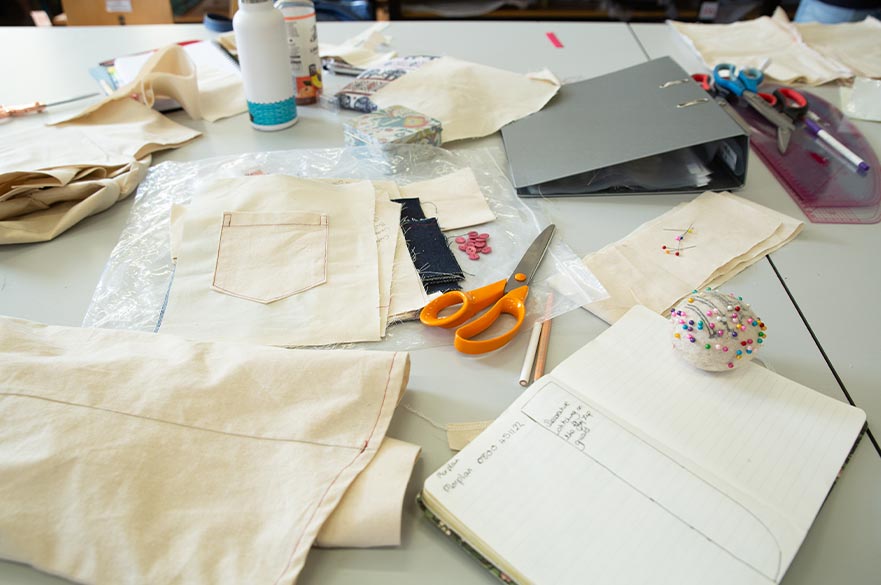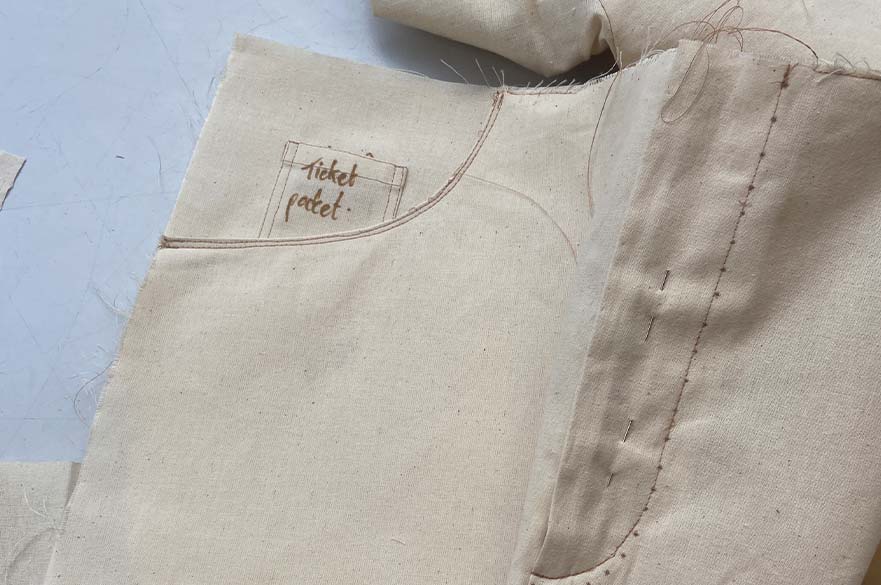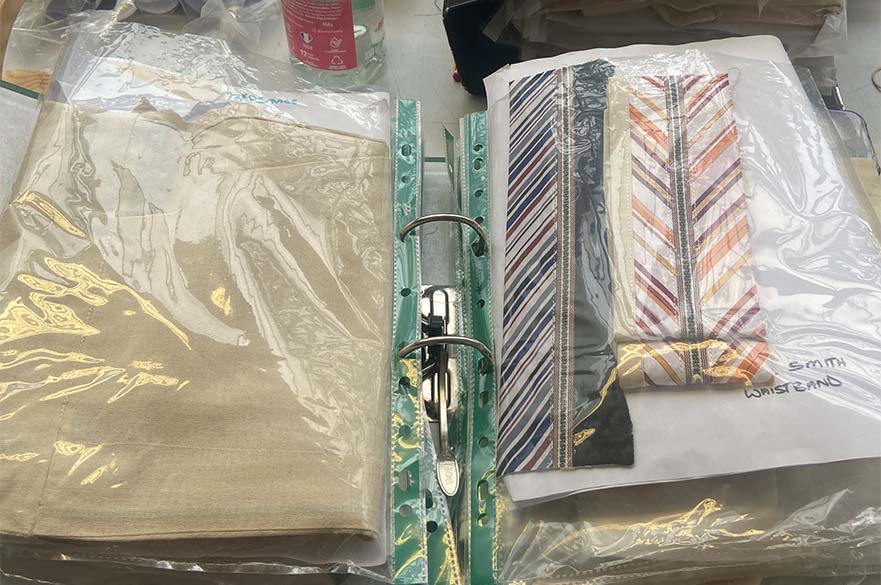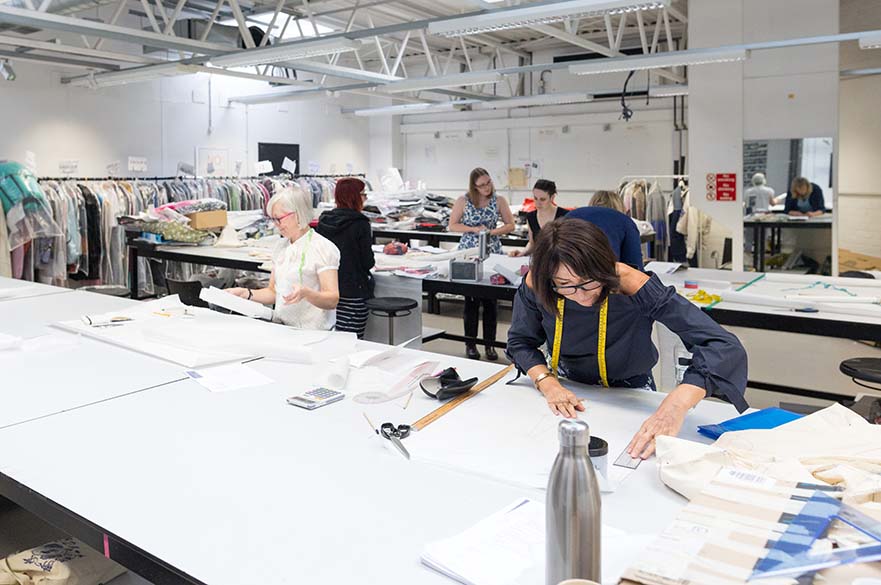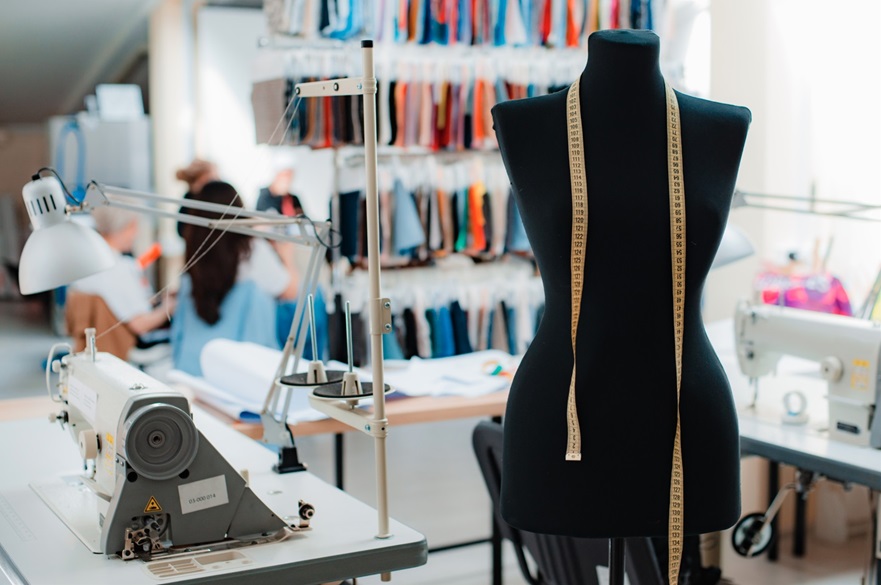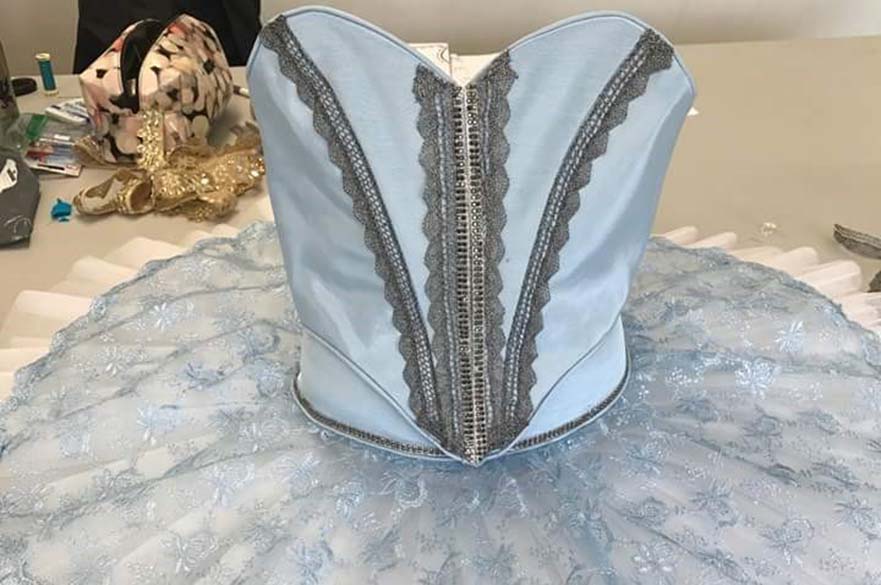Sewing Techniques: Methods for Professional Finishing
- Level(s) of Study: Short course
- Course Fee:
£695 or £675 (August 2025)
- Start Date(s): 4 August 2025, 15 November 2025, 28 February 2026
- Duration: Saturdays 10 am - 4 pm, five weeks or Monday to Friday 10 am - 4 pm, one week
- Study Mode(s): Part-time
- Campus: City Campus
- Entry Requirements: More information
Introduction:
Course dates:
4 - 8 August 2025, Monday to Friday 10 am - 4 pm
15 November - 13 December 2025, Saturdays 10 am - 4 pm
28 February - 28 March 2026, Saturdays 10 am - 4 pm
Would you like to take your sewing to the next level?
Perhaps you’ve already made a few dresses and even completed some trickier projects and now you’re ready to develop your basic machine sewing skills to professional standard.
Come and spend five days seriously improving your sewing techniques on this intensive, practical course based in our professional fashion studios.
On this course, you’ll progress through each of the sewing techniques, practicing how to make a collar, cuffs, button stands, sleeves, plackets and button holes in calico fabric.
-
You’ll be part of a design community in our creative studio culture; one that promotes discussion and collaboration, and encourages experimentation and the constant swapping of ideas.
-
With a limited class size you'll have the one-to-one attention you need to ensure you leave with the skills to continue developing your designs at home or work.
-
Benefit from learning with an experienced tutor who has established links to the profession and significant experience working in varied practices.
-
On successful completion of the course you will receive a certificate of attendance.
Here’s what our previous attendees said:
"I wanted to do this course to increase my self taught sewing skills. I've had a really useful experience in gaining knowledge and tips to produce professional garments. The relaxed atmosphere made the course very enjoyable and I am happy with the amount I have learnt."
"I've gained confidence and knowledge of difficult finishing processes. I'd do this course all over again! The tutor was an excellent, she checked in with us regularly and was comfortable to let us work to our own pace."
"I've learnt so much, mostly that I'm quite good at sewing! She is the loveliest tutor, she has so much patience and kindness."
"Following this course I feel empowered by the variety of sewing techniques I have learnt. I would love there to be part two of this course."
"After the completion of this course I feel confident that my sewing skills have been improved. I especially enjoyed the pace of the course and detail work."
"I would recommend this course it was excellent, I have improved my knowledge and sewing techniques."
"I wanted to improve my sewing and I now have much more confidence about approaching shirts and trousers, and really enjoyed putting in a fly zip! The tutor is fabulous."
"I make dance costumes and wanted to do this course as professional development, and I have taken away so very much. We managed to get through so much during the week - the tutor has been amazing!"
What you’ll study
During the course, you will:
- learn about grain lines, fabrics and their suitability to different projects
- cut, lay, fold and bias cut on reverse fabrics
- fuse fabrics, and learn why fabrics are fused differently
- use an over-locker, and learn (or remind yourself) how to set one up
- make buttonholes and understand different buttonhole construction
- sew and assemble a shirt from start to finish in calico.
You’ll be introduced to the techniques through group demonstrations, handling samples, paper-based instructions and one-to-one feedback.
You’ll explore different types of fabric (with access to the university fabric store) and the various methods of cutting and over-locking.
Shirt Project
- Examples of different shirts
- Samples of different collars, cuffs and button stands
- Fabrics that are used for making shirts
- Cutting the shirt out of calico ready to sew and fusing the fabric
- Learning about grainlines
- Learning about fusing, how it’s used, why it’s used and different types of fusing available.
Collar and Collar Stand:
- Top Collar Fused
- Inner Collar Stand Fused
- Sewing the collar and Collar stand together.
Shoulders and Yolk:
- Sewing shoulders together and sewing the Yoke
- Sleeve, Placket, Cuff, Button stand and marking button holes
- Attaching sleeve to the body, sewing placket and cuff
- Sewing the button stand and marking button holes.
Examples of different button-holes and sizes that can be achieved:
- Regular (shirts and dresses)
- Eyelet (jackets, trousers and jeans)
- Samples provided for students to take home.
Catch up & finishing off:
Students can use the last session to cut fabric for a shirt (Shirting fabric) that they will make during the session if they have finished or to make it at home.
Trouser Project
- Zip Overlocking zip and Zip guard
- Sewing zip to the trouser front (Left)
- sewing zip to zip guard
- Sewing zip to trouser front (Right)
- Sewing zip to Zip guard
Pockets
- Sewing curved pocket
- Sewing slanted pocket (Tailored)
Belt loops
- Overlocking belt loops
- pressing belt looks
- Topstitching belt loops
Waistband
- Talking about different waistbands
- Sewing waistband (Left)
- Pressing waistband
- Under stitching waistband.
- Sewing waistband (right with overlap)
- Pressing waistband
- Under stitching waistband
- Closure attaching jeans button
Students can choose one of three patterns to sew for the last weeks. The aim of this is to put all the new skills that have been learned during the course into practice.
It gives you an opportunity to ask garment-specific questions.
You'll cover:
- Prep work
- Looking at fabric
- Cutting fabric
- Fusing
- Overlocking
- Starting to sew the garment to finish at home.
Student Work
How you’re taught
This is a hands on, practical course taught on the Nottingham Trent University city campus.
Contact hours
You will receive 25 contact hours of quality tuition with an experienced tutor.
Careers and employability
On successful completion of the course you will receive a certificate of attendance, which will further enhance your CV.
Campus and facilities
You will be based in the School of Art and Design on the City Campus.
You will have access to an excellent range of facilities and equipment in the fashion studios, with industry-standard fashion tables, professional mannequins, and space to work on your projects.
You’ll also have access to our library to use outside of your short course; whilst you can’t reserve or take away books, you are welcome to use them as a resource for research and referencing.
You will receive an email one week before the course starts with joining instructions on where to go for the first day.
Entry requirements
Level: Beginner/Intermediate
Entry requirement: You should have already made a few basic garments, and feel confident using a sewing machine and working from a commercial paper pattern.
You must be over the age of 18 to attend this course.
Fees and funding
The fee for this course is £695 or £675 (August 2025).
Payment is due at the time of booking - ask us if you'd prefer an invoice sent to your company.
Secure your place with a deposit - If you're booking more than two months before the course starts, we can accept a £200 deposit to secure your place, and the balance is due one month before the course starts.
Your course fees cover the cost of studies, including great benefits such as the use of our modern library and free use of the IT equipment and software on the campus during your course.
What to Bring
Whilst a lot of materials, spare equipment and calico are supplied, you’ll need to start building your own tool kit so that you can continue sewing after the course.
Therefore, please bring with you to the first day:
- paper scissors, fabric scissors and trimming scissors (little scissors)
- tape measure
- selection of needles
- dress maker pins
- notebook and pen
- tailors chalk
- depending on your progress you may wish to source additional calico and fabric - further details will be discussed during the course.
You can read the terms and conditions of booking here.
Need accommodation for a week long summer course?
Accommodation can be booked separately to the course; the rooms are only a few minutes’ walk from our studios and classrooms, and cost £259 per week.
These are single rooms with a private bathroom in shared apartments in Nottingham Trent University’s city campus accommodation, which is ideal if you're looking to be based in Nottingham's lively city centre and want an economical place to stay.
Find out more and book your accommodation here.
How to apply
You can book your place via the NTU online store:
4 - 8 August 2025, Monday to Friday 10 am - 4 pm
15 November - 13 December 2025, Saturdays 10 am - 4 pm
28 February - 28 March 2026, Saturdays 10 am - 4 pm
Browse all our fashion, textiles and costume short courses.
Any questions?
Contact the short course team:
Email: creativeshortcourses@ntu.ac.uk
Tel: +44 (0)115 848 2813

